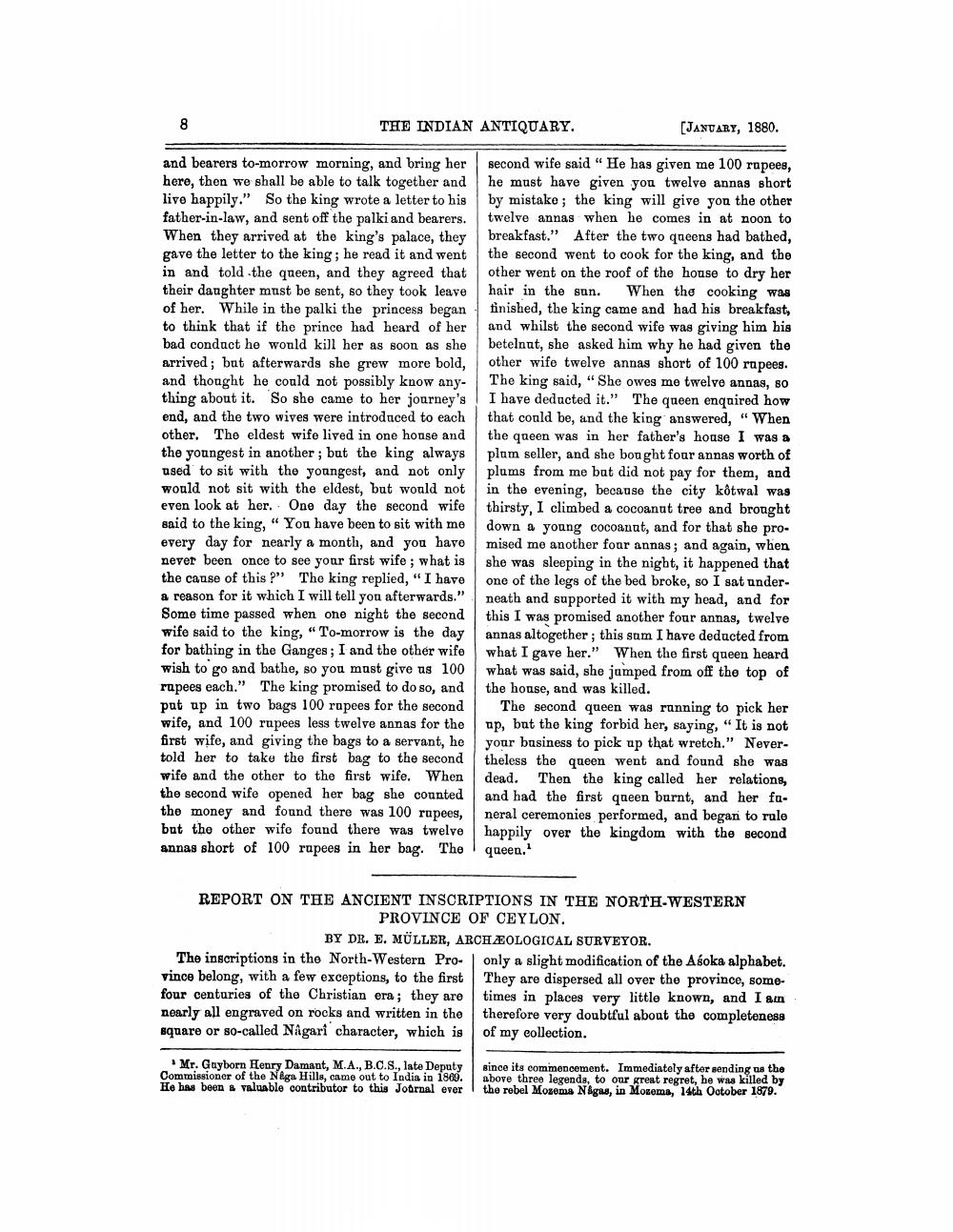________________
8
THE INDIAN ANTIQUARY.
and bearers to-morrow morning, and bring her here, then we shall be able to talk together and live happily." So the king wrote a letter to his father-in-law, and sent off the palki and bearers. When they arrived at the king's palace, they gave the letter to the king; he read it and went in and told the queen, and they agreed that their daughter must be sent, so they took leave of her. While in the palki the princess began to think that if the prince had heard of her bad conduct he would kill her as soon as she arrived; but afterwards she grew more bold, and thought he could not possibly know anything about it. So she came to her journey's end, and the two wives were introduced to each other. The eldest wife lived in one house and the youngest in another; but the king always used to sit with the youngest, and not only would not sit with the eldest, but would not even look at her. One day the second wife said to the king, "You have been to sit with me every day for nearly a month, and you have never been once to see your first wife; what is the cause of this ?" The king replied, "I have a reason for it which I will tell you afterwards." Some time passed when one night the second wife said to the king, "To-morrow is the day for bathing in the Ganges; I and the other wife wish to go and bathe, so you must give us 100 rupees each." The king promised to do so, and put up in two bags 100 rupees for the second wife, and 100 rupees less twelve annas for the first wife, and giving the bags to a servant, he told her to take the first bag to the second wife and the other to the first wife. When the second wife opened her bag she counted the money and found there was 100 rupees, but the other wife found there was twelve annas short of 100 rupees in her bag. The
The inscriptions in the North-Western Province belong, with a few exceptions, to the first four centuries of the Christian era; they are nearly all engraved on rocks and written in the square or so-called Nagari character, which is
[JANUARY, 1880.
second wife said "He has given me 100 rupees, he must have given you twelve annas short by mistake; the king will give you the other twelve annas when he comes in at noon to breakfast." After the two queens had bathed, the second went to cook for the king, and the other went on the roof of the house to dry her hair in the sun. When the cooking was finished, the king came and had his breakfast, and whilst the second wife was giving him his betelnut, she asked him why he had given the other wife twelve annas short of 100 rupees. The king said, "She owes me twelve annas, so I have deducted it." The queen enquired how that could be, and the king answered, "When the queen was in her father's house I was a plum seller, and she bought four annas worth of plums from me but did not pay for them, and in the evening, because the city kôtwal was thirsty, I climbed a cocoanut tree and brought down a young cocoanut, and for that she promised me another four annas; and again, when she was sleeping in the night, it happened that one of the legs of the bed broke, so I sat underneath and supported it with my head, and for this I was promised another four annas, twelve annas altogether; this sum I have deducted from what I gave her." When the first queen heard what was said, she jumped from off the top of the house, and was killed.
REPORT ON THE ANCIENT INSCRIPTIONS IN THE NORTH-WESTERN
PROVINCE OF CEYLON.
BY DR. E. MÜLLER, ARCHEOLOGICAL SURVEYOR.
Mr. Guyborn Henry Damant, M.A., B.C.S., late Deputy Commissioner of the Naga Hills, came out to India in 1800. He has been a valuable contributor to this Journal ever
The second queen was running to pick her up, but the king forbid her, saying, "It is not your business to pick up that wretch." Nevertheless the queen went and found she was dead. Then the king called her relations, and had the first queen burnt, and her faneral ceremonies performed, and began to rule happily over the kingdom with the second queen.'
only a slight modification of the Aśoka alphabet. They are dispersed all over the province, sometimes in places very little known, and I am therefore very doubtful about the completeness of my collection.
since its commencement. Immediately after sending us the above three legends, to our great regret, he was killed by the rebel Mozema Nagas, in Mozema, 14th October 1879.




